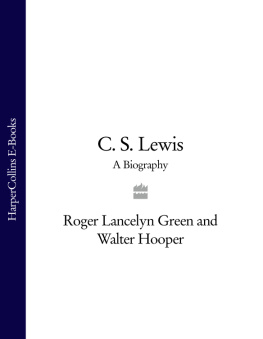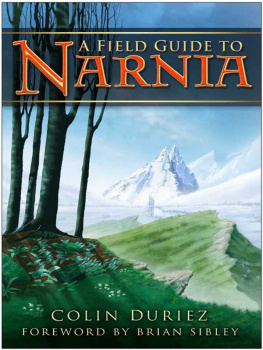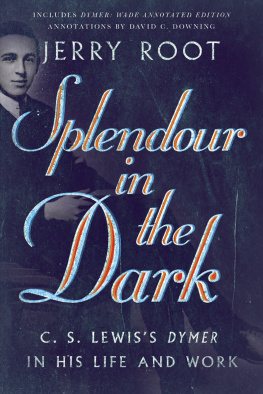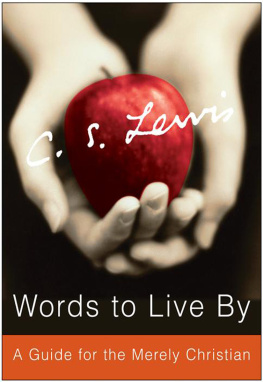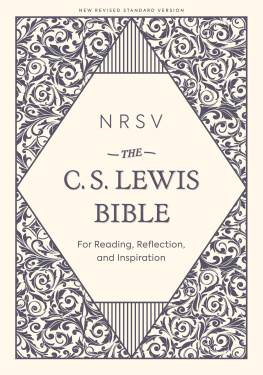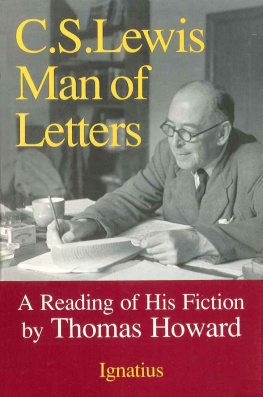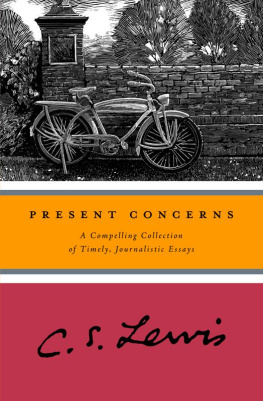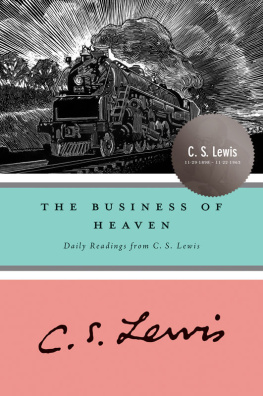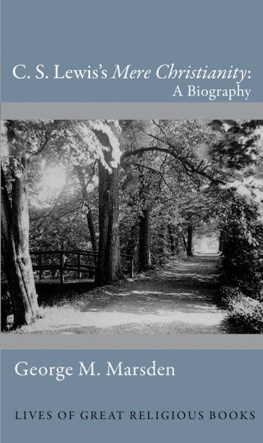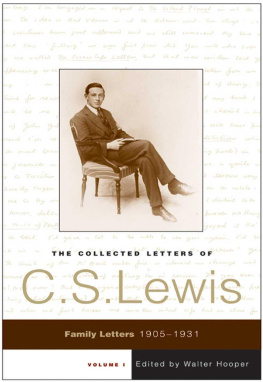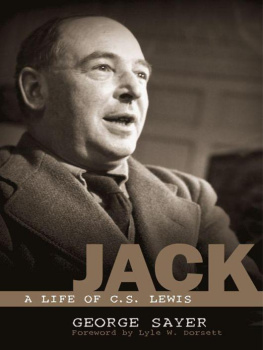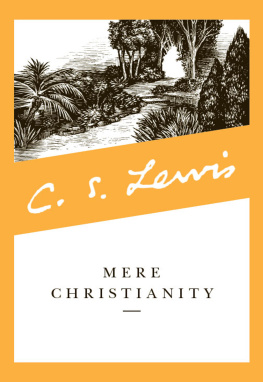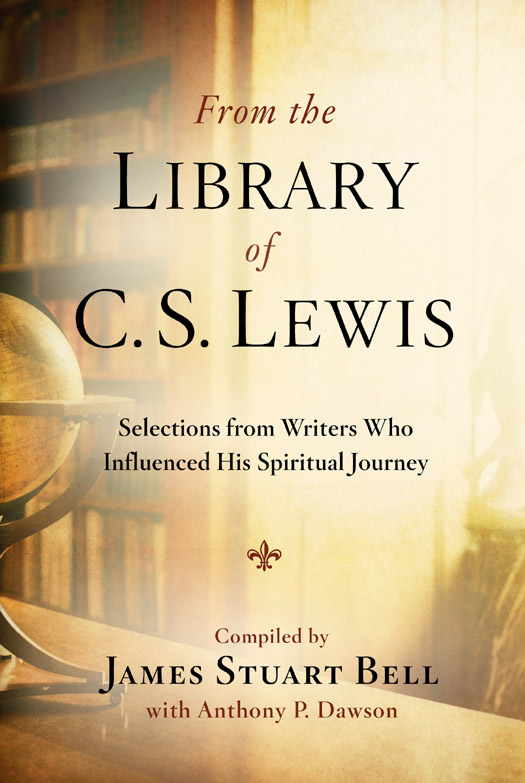
Praise for
From the Library of C. S. Lewis
This is a knowledgeable and inspired selection from what C. S. Lewis called the old books that nurtured his mind, spirit, and imagination. All who love the writings of the master will enjoy these engaging passages from the vast range of Lewiss reading and relish the light that they cast upon his concerns.
C OLIN D URIEZ , author of A Field Guide to Narnia, Tolkien andC. S. Lewis, and The C. S. Lewis Encyclopedia
This is the perfect entrance to the world C. S. Lewis inhabited, and it arrives just when that world of books is under threat of extinction. Thanks to those who have given us such a gold mine.
W ALTER H OOPER , literary advisor to the C. S. Lewis estate, one of the worlds leading authorities on the life and works of C. S. Lewis, and the editor of dozens of Lewiss works
C. S. Lewis, one of the great men of letters of the twentieth century, loved books. To truly know Lewis, one must become familiar with the body of literature that marked his life. Jim Bell and Tony Dawson give curious students of Lewis a glimpse of the books and authors that informed his lifes work and kindled his imagination.
J ERRY R OOT , assistant professor of Christian Formation and Ministry at Wheaton College, coeditor of The Quotable C. S. Lewis, and a C. S. Lewis scholar
One of the great benefits of reading C. S. Lewis is his singular ability to introduce his own readers to the works of other authors. In this volume, Bell and Dawson have made it easier for us to uncover the literary influences and preferences that characterized Lewiss own reading. The editors have arranged these excerpts around a variety of appealing subjects such as fantasy and imagination, suffering, prayer and contemplation, and Gods love. This arrangement invites the reader to enter into the selections devotionallyto enjoy and benefit from these literary treasures much as Lewis himself did. This book is an excellent resource for those interested in meeting new authors, as well as a wonderful way to remind ourselves of favorite texts too long neglected.
M ARJORIE L AMP M EAD , associate director of the Marion E. Wade Center, Wheaton College, and coeditor of Brothers and Friends: The Diaries of Major Warren Hamilton Lewis and C. S. Lewis: Letters to Children
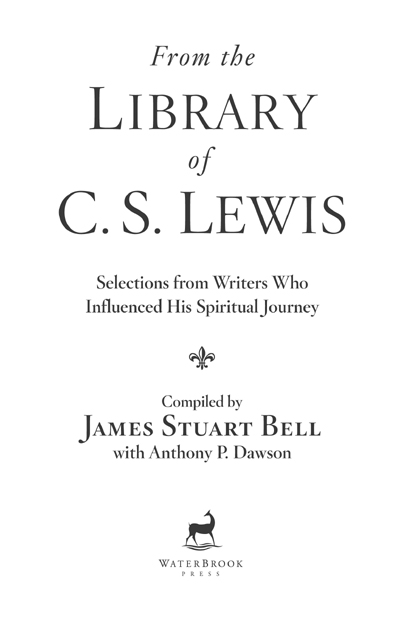
F ROM THE L IBRARY OF C. S. L EWIS
P UBLISHED BY W ATER B ROOK P RESS
12265 Oracle Boulevard, Suite 200
Colorado Springs, Colorado 80921
Please see for complete acknowledgment of copyrighted pieces.
Please note that some of the selections in this book have been condensed from the original work and in some cases wording has been slightly modernized.
Copyright 2004 by James S. Bell Jr.
All rights reserved. No part of this book may be reproduced or transmitted in any form or by any means, electronic or mechanical, including photocopying and recording, or by any information storage and retrieval system, without permission in writing from the publisher.
Published in the United States by WaterBrook Multnomah, an imprint of the Crown Publishing Group, a division of Random House Inc., New York.
W ATER B ROOK and its deer colophon are registered trademarks of Random House Inc.
The Library of Congress cataloged the hardcover edition as follows:
From the library of C. S. Lewis : selections from writers who influenced his spiritual journey / compiled by James Stuart Bell with Anthony Palmer Dawson; foreword by Lyle W. Dorsett.
p. cm. (A writers palette book)
A Shaw book.
Includes bibliographical references.
eISBN: 978-0-307-55170-2
1. Lewis, C. S. (Clive Staples), 18981963Religion. 2. Lewis, C. S. (Clive Staples), 18981963Sources. I. Bell, James S. II. Dawson, Anthony P. III. Series.
BX5199.L53F76 2004
230dc22
2004008998
v3.1
CONTENTS
FOREWORD
Jim Bell and Tony Dawson have compiled a selection of readings that will nourish the spiritual and intellectual hunger of healthy souls in several ways. First, these readings are in and of themselves a superb tonic to refresh the thirsty soul. Second, these selections reveal much about C. S. Lewiss inner life. Included here are samplings from the massive collection of authors whose writings shaped one of the most influential writers of the twentieth century. Finally, these splendid readings serve as an introduction to a large group of writers whose works enriched Lewiss soul. I would expect many readers to discover for the first time some of the authors who profoundly shaped Professor Lewiss mind and heart. For people who are unfamiliar with many of the authors included here, this book will be the beginning of a delightful educational journey.
In brief, I have found this book to be at once a unique and rich selection of daily readings. It should have a wide audience and a long life.
Lyle W. Dorsett, professor of Christian Formation and Ministries, Wheaton College, Wheaton, Illinois
SPECIAL THANKS
Special thanks go to Professor Jerry Root, Lewis scholar at Wheaton College, for his keen insights into Lewis. We would also like to express our gratitude to Corey Thomas, Marjorie Lamp Mead, and the staff of the Marion E. Wade Center for their kind and invaluable assistance as we consulted books from C. S. Lewiss library. We also want to thank Anna Thiel for proofreading the manuscript; her careful attention to detail and insightful comments proved most helpful.
INTRODUCTION
When I wrote my masters thesis on C. S. Lewis twenty-five years ago at University College Dublin, I thought there had already been an exhaustive study of possible spiritual and literary influences on this towering twentieth-century shaper of Christian thought. Yet still today, readers and scholars pour out a perpetual torrent of books, articles, and graduate theses, continuing to speculate on these same influences. This proves there is still much to be learned about the origins of Lewiss intellectual and spiritual backgrounds. Yet, except for the scholars doing the research, most of us are probably not familiar with these sources of his inspiration.
The Hound of heaven pursued the self-described most reluctant convert in England using the arguments of friends and other factors to draw him, but it was primarily the Christian wisdom of the ages that brought Lewis to his knees and caused him to grow spiritually. Lewis would agree with the statement that great thinkers stand on the shoulders of giants. His conversion to Christianity began by acknowledging respect for those writers he considered truly great (people like George MacDonald, G. K. Chesterton, Samuel Johnson, Edmund Spenser, and John Milton) in spite of the fact that they were Christians.
Lewis would later admit that without these and other profound spiritual influences he could not be the kind of Christian he was, nor could he have the impact on the world with his own writings that he did. If that is so, these writings should have intrinsic value for all of us, as well as help us better understand the spiritual formation of C. S. Lewis himself.
To truly understand Lewis and his works we need to get behind his role as Christian apologist to his interest in philosophy and literature, in reason and romanticism. Lewis was not a one-dimensional reader. His eclectic tastes ranged over a wide variety of genres and time periods. He was a fan of science fiction and fantasy writers as well as Aristotle, Shakespeare, and Augustine. In Lewiss world, myth and allegory mix with precise logic in philosophical debate. Scholars continue to explore how these influences fit together, but there is no magic formula; Lewis was a complex figure who didnt quite fit the trends of his own generation and is able to speak to the needs of each succeeding one.


